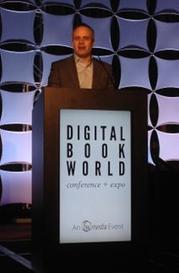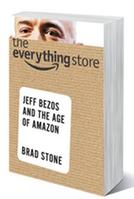On the second day of Digital Book World 2014, many of the morning's keynote speakers focused on one subject: Amazon.com. Brad Stone, author of The Everything Store: Jeff Bezos and the Age of Amazon, led off by highlighting instances from his book that he believed would help "illuminate the way Amazon operates" and help publishers predict how Amazon may operate in the future.

|
|
| Brad Stone | |
The launch of the original Kindle e-reader, Stone said, was the company's defining moment, and Bezos has been "running the same playbook" ever since. It took three years to develop the first Kindle, and the company's senior vice-presidents argued against the project. The Kindle's runaway success has emboldened Amazon, Stone asserted, and the company has tried to replicate that success in each new market that it's entered. He speculated that right now, "Amazon has offices working on hardware: set-top boxes, mobile phones and who knows what else."
"There might be an inclination in the industry or at Digital Book World to take comfort or glee in the declining pace of change in the book business," Stone cautioned, referring to the leveling-off of e-book sales and the mixed results of Amazon's publishing efforts. "I can assure you that Bezos and his colleagues do not believe that the pace of change in any business is stagnating," he continued. "The one constant is that [Amazon] does not give up. It's fairly ruthless and self-absorbed in how it tries to disrupt existing order."
Joseph Esposito, publishing consultant and president at Processed Media, discussed Amazon's growing, often-overlooked share of the institutional book market and the difficulty of gaining insight into Amazon's business. Not only is Amazon "notoriously secretive," said Esposito, but much of the information that it releases is also intentionally misleading. When Amazon announced that e-books were outselling print books, Esposito added, the company neglected to mention that it was referring only to its own sales. Subsequent, uncritical reports from the general media also contributed to the misconceptions.
"It would lead you to believe that print books have disappeared," he said.
To find information about Amazon, Esposito polled university presses and libraries. He found that university presses had declining sales to traditional wholesalers such as Baker & Taylor and Ingram and increasing sales to Amazon, while librarians, especially those with severe budget restrictions, are turning to Amazon in greater numbers. Given that Amazon is also a customer of Baker & Taylor, the situation can be bizarre: Esposito brought up the case of a librarian who, needing a book on short notice, went to Amazon rather than Baker & Taylor, saying that B&T orders would take two weeks while Amazon orders would take two days. The rush Amazon orders, however, were drop-shipped by B&T. The implication here is that wholesalers provide higher levels of service to Amazon than to their direct customers.
In a subsequent panel on the future of Amazon and the publishing business, Michael Cader of Publishers Lunch encouraged members of the book business to stop thinking about "being under siege," and instead think about ways to innovate. The resurgence of local, independent bookstores, Cader said, offered a "glimmer of hope" to those wanting to take some of the business back from Amazon. Cader, along with Esposito and Stone, suggested that publishers and booksellers can also take advantage of Amazon having to fight hard battles on so many fronts--in essentially every market that it's entered since it established itself in the book industry.
"We ought to think about where can people who know the book business well adopt the 'Amazonian' attitude," Cader suggested. "If you put a bicycle in every independent bookstore, that could defeat octocopters."
During the same panel, Esposito advised publishers not to look to the Department of Justice or any other government agency for help against Amazon.
"My observation is that everything to do with antitrust issues seems to come down to what does it cost the customer," he reflected. "Where consumer prices are kept low, things seems to pass muster with the DoJ. I don't see any reason to see regulatory support going ahead. It seems to me that publishers can do more in this situation by being more innovative than appealing to regulatory forces."
Jim Cramer, the host of CNBC's Mad Money and author of Get Rich Carefully, also briefly reflected on Amazon during his talk on investment prospects in the publishing business.
"If Amazon would report earnings, I believe their stock would go down," said Cramer. "They've never been constrained by the need to make money." --Alex Mutter

